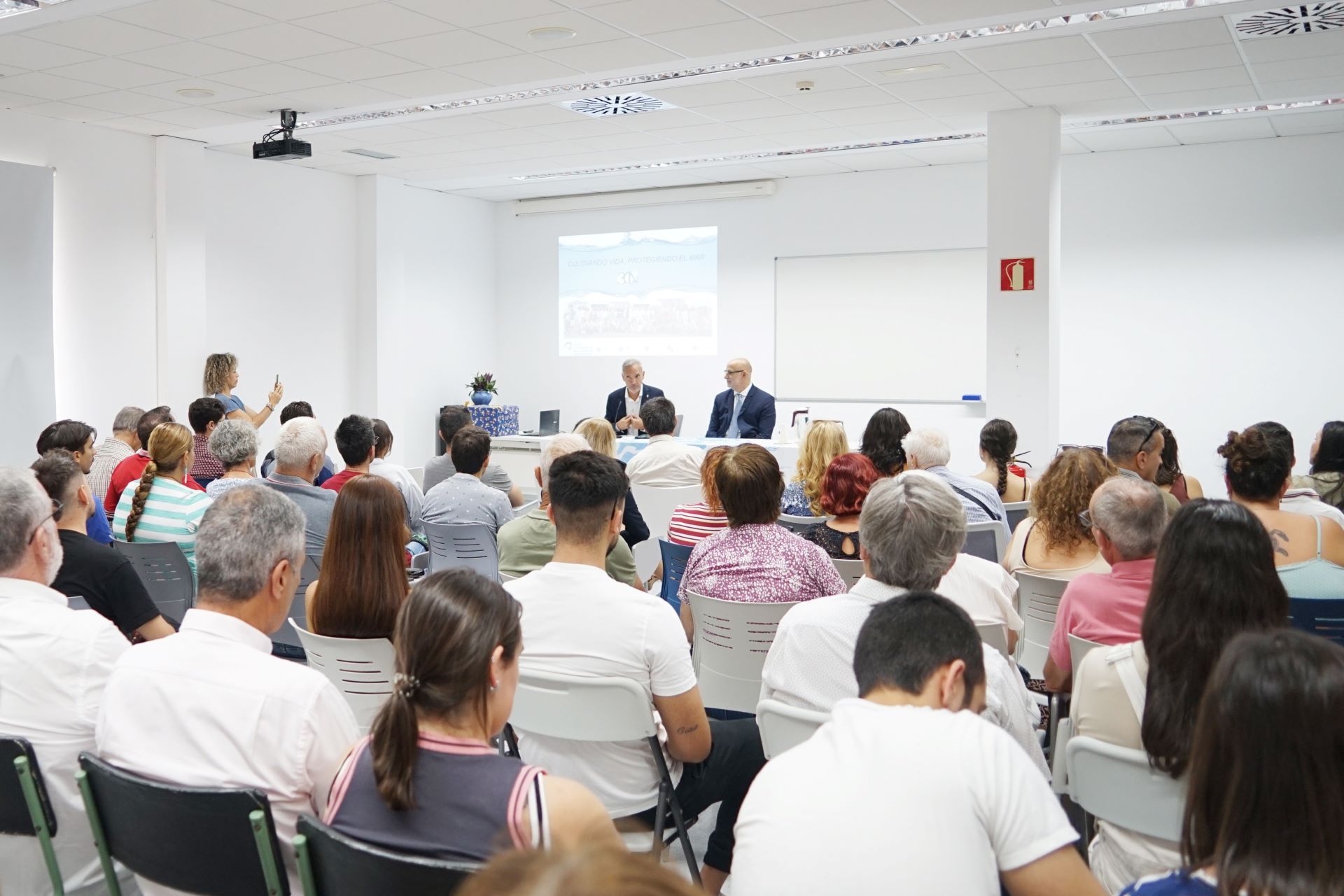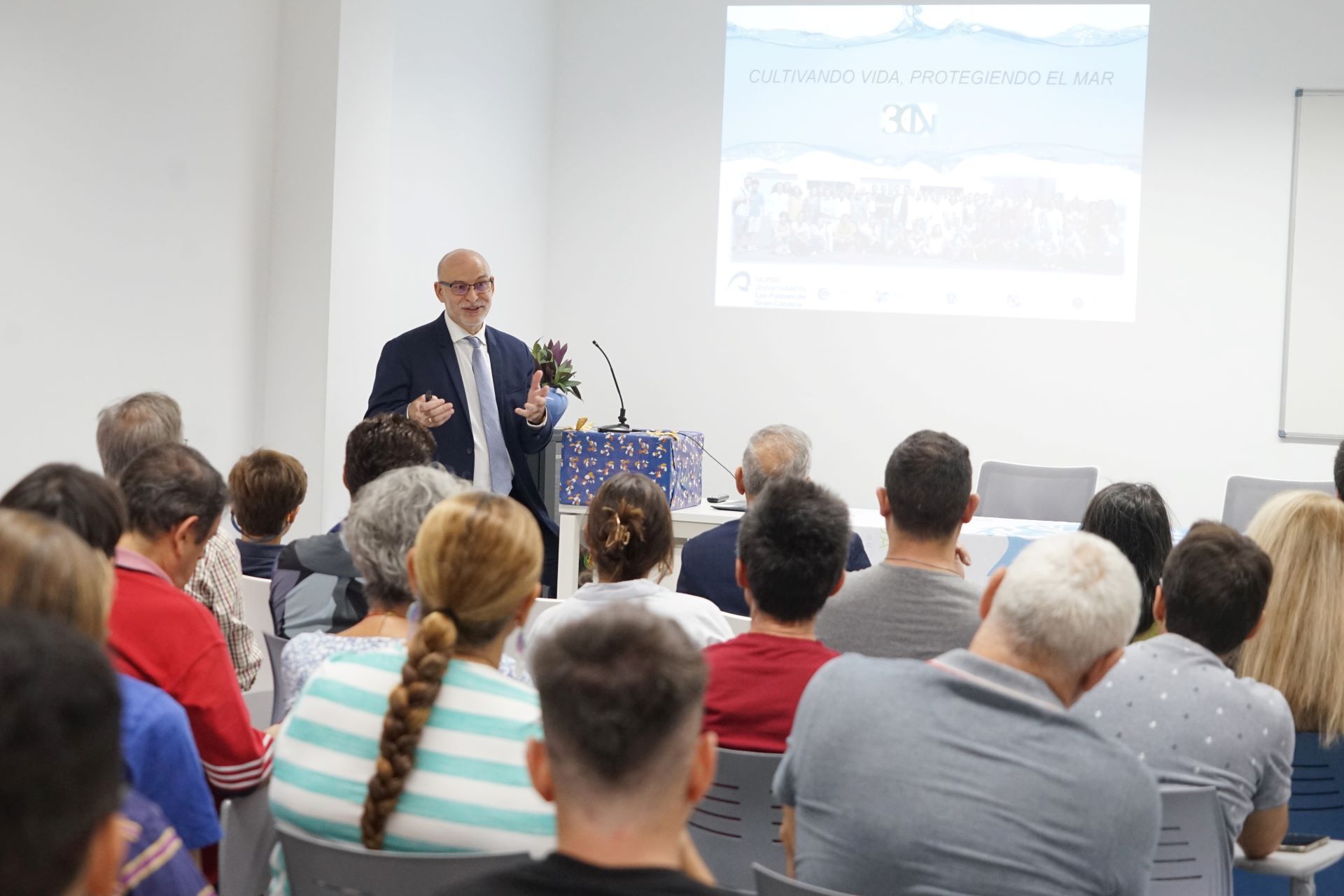The facilities of the Marine Science and Technology Park of the ULPGC, in Taliarte (Telde), hosted today, before more than 100 attendees, a day under the slogan ‘Cultivating life, protecting the sea’ with eight short talks and a gastronomic tasting of aquaculture products
The ULPGC, through one of the projects of the GIA group, is already responsible for 13 out of every 100 pieces of white shrimp consumed in Europe and 3 out of every 100 consumed worldwide
The facilities of the Research Institute for Sustainable Aquaculture and Marine Ecosystems (ECOAQUA) of the University of Las Palmas de Gran Canaria (ULPGC), hosted today, in front of more than 100 attendees, the celebration of World Aquaculture Day with a full programme of short talks and a tasting of aquaculture products with the aim of raising awareness in Canarian society about the great scientific and socio-economic importance of aquaculture as a crucial tool in the food security of humanity and the sustainability of the planet as one of the most efficient ways of providing healthy, natural and nutrient-rich food for the population.
Under the slogan ‘Cultivating life, protecting the sea’, the event, held at the facilities located in the Marine Science and Technology Park in Taliarte (Telde), was inaugurated by Javier Franco Hormiga, director of the Canary Islands Agency for Research, Innovation and the Information Society (ACIISI) of the Canary Islands Government, together with Juan Manuel Afonso López, director of the Aquaculture Research Group (GIA) of ECOAQUA and responsible for the organisation of this event.
 The director of the Canary Islands Agency for Research, Innovation and the Information Society (ACIISI) of the Canary Islands Government, Javier Franco Hormiga, on the left, together with Juan Manuel Afonso López, director of the ECOAQUA GIA.
The director of the Canary Islands Agency for Research, Innovation and the Information Society (ACIISI) of the Canary Islands Government, Javier Franco Hormiga, on the left, together with Juan Manuel Afonso López, director of the ECOAQUA GIA.
Hormiga stressed in his speech that scientific knowledge about aquaculture and the marine environment is ‘vital’ to provide ‘a better quality of life both for citizens around the world and in the Canary Islands’. ‘This is possible, he said, through strategies such as the ‘Blue Economy’, promoted by the Canary Islands Government, whose pillars include the promotion of competitiveness and innovation in aquaculture and blue biotechnology, in line with the priorities established by Europe.
After the welcome, Afonso López gave the first of the eight short talks that formed part of the conference: ‘Canarian aquaculture and its impact on society’, where he stressed that the only model to follow to be able to supply the planet in the future in a sustainable way is through the aquaculture sector.
 Juan Manuel Afonso López, director of ECOAQUA's GIA, during his presentation.
Juan Manuel Afonso López, director of ECOAQUA's GIA, during his presentation.
Currently, he said, ‘the human population is 8 billion and population growth models predict that the population of the Canary Islands will be at least 2.5 million by 2033, while that of the entire planet will reach 10 billion by 2050. This poses an immense challenge for humanity to obtain healthy and adequate food, something that requires viable solutions’.
To make this a reality, the Food and Agriculture Organization of the United Nations (FAO) ‘has already established that the species that will mainly contribute to the solution are fast-growing species,’ he said.
In this sense, the GIA director continued, this organisation indicates that 33% of aquaculture growth up to the year 2030 will be represented by tilapia, shrimp, prawns and marine fish. Within this development framework, ‘the GIA is already contributing to projects on fast-growing marine fish species through clean energy, such as Seriola dumerili (European AQUAWIND project).
A crucial role in global food supply
With scientific initiatives such as PMG-BIOGEMAR, the GIA also plays a decisive role in the industrial research of the white shrimp (Penaeus vannamei) in Ecuador, the leading country in its production. In this case, he pointed out, ‘the ULPGC is already responsible for 13 out of every 100 pieces consumed in Europe and 3 out of every 100 consumed worldwide’.
In addition, the GIA contributes to the industrial development of fast-growing marine fish species in the Indo-Pacific such as Sobaity (Sparidentex hasta), Pompano (Trachinotus blochii) and Mangrove Red Snapper (Lutjanus argenticulatus), in collaboration with the Saudi Arabian government (KAUST).
On the other hand, added Juan Manuel Afonso López, ‘the Government of the Canary Islands was the first autonomous community to draw up an Aquaculture Management Plan, the PROAC, through marine spatial planning, defining 30 Aquaculture Interest Zones (ZIA) along the coast of the Canary Islands archipelago (Lanzarote, Fuerteventura, Gran Canaria, Tenerife and La Palma), compatible with the rest of the economic activities, with a maximum load of just over 0.4 million tonnes’.
In his opinion, ‘this biomass culture provides for the self-sufficiency of the Canary Islands in terms of supplying quality fish and complementing the diversification of its economic model, with an estimated per capita fish consumption of almost 17 kg per person per year.
The ECOAQUA researcher also asserted that this aquaculture culture will serve to meet the demand of the tourism sector, which in 2023 had a record influx of tourists with a total of 16.2 million, which, in 2024, is expected to increase by an additional 5%, reaching 17 million tourists.
Cellular aquaculture and its reduced environmental impact
The event also featured a presentation by postdoctoral researcher Álvaro Torres-Gómez entitled ‘Cellular aquaculture’. In it, the scientist explained that cellular aquaculture, an emerging technique that allows cells of marine organisms to be cultivated in the laboratory, ‘is gaining traction and can be a complement to traditional aquaculture’.
.jpg) Postdoctoral researcher Álvaro Torres-Gómez, during his talk.
Postdoctoral researcher Álvaro Torres-Gómez, during his talk.
This technology, Dr Torres-Gómez said, ‘not only contributes to reducing the overexploitation of the oceans, but also helps preserve biodiversity and mitigate pollution from microplastics and other contaminants. It also responds to the growing demand for ethical and sustainable products promoted by animal welfare and dietary movements.
One of the main advantages of cell culture of marine organisms ‘is its lower environmental impact, as it requires less water, land and energy than conventional methods’. Also, said the postdoctoral researcher, ‘it avoids risks such as the transmission of diseases between species and the pollutants and microplastics found in the marine environment.
According to Álvaro Torres-Gómez, ‘cellular aquaculture also makes it possible to solve the formulation of aquaculture feeds. This depends on fishmeal, the production of which has a significant environmental impact. Current alternatives (yeast, vegetables and insects) cause inflammation in these fish and therefore reduce their welfare. By using fish proteins, these would not cause allergic phenomena, making it possible to obtain high quality proteins, rich in essential amino acids and micronutrients’.
As part of the European AQUAEXCEL3.0 project, researchers are developing sea bream cell lines capable of producing more omega-3 and omega-6 fatty acids, which are essential for health. Using the CRISPR-Cas9 gene-editing technique, the aim is to optimise the production of these healthy fats by eliminating the fish's natural braking mechanisms.
This breakthrough, says researcher Torres-Gómez, ‘could revolutionise fish feed formulation, reducing reliance on fishmeal. This approach not only offers a more sustainable and ethical alternative, but also opens up new opportunities for scientific research and innovation in the aquaculture sector.
The day was completed with short talks by students of the PhD programme in Sustainable Aquaculture and Marine Ecosystems (ACUISEMAR) led by the GIA for the ULPGC.
Luis Molina Roque was in charge of the presentation ‘Circular economy in aquaculture’; Marina Martínez Soler addressed ‘Commercial shrimp farming’; Valery Ravelo Ramírez spoke about ‘Welfare in sea bass’; Charles Joan developed ‘Do sea bass like Canarian dates’; Antonio Gómez Mercader explained ‘Alternative methods of animal experimentation’; while Abiam Remache Díaz delved into the ‘Application of artificial intelligence for morphology in prawns’.
After a guided tour of the aquaculture facilities of the ULPGC, as a closing event of this day to celebrate World Aquaculture Day, attendees enjoyed a tasting of aquaculture products, such as premium Canarian sea bass (from the company AQUANARIA), Canarian crab (from the ULPGC) and prawns from Ecuador (from RODA International), prepared in culinary creations by chefs from Maraca Las Palmas - Taberna Viajera.
.jpg) Juan Manuel Afonso López, director of the GIA, showing a group of the attendees the ECOAQUA facilities.
Juan Manuel Afonso López, director of the GIA, showing a group of the attendees the ECOAQUA facilities.


